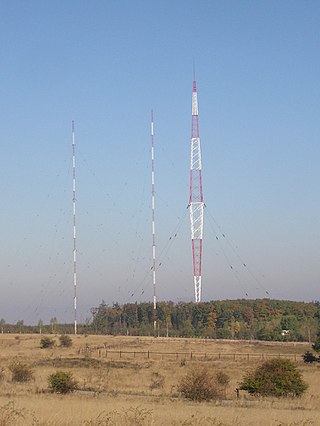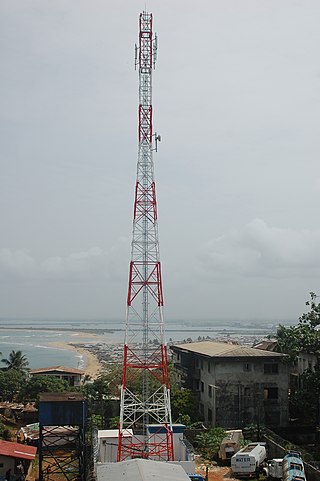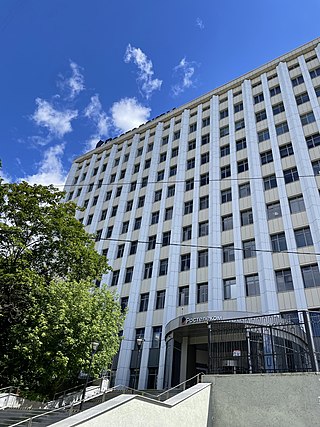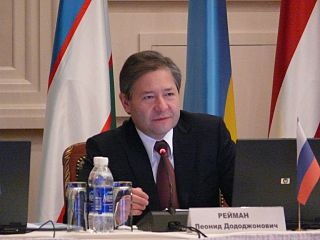Related Research Articles
Telecommunications in Botswana include newspapers, radio, television, fixed and mobile telephones, and the Internet.

Telecommunications in Bulgaria include radio, television, fixed and mobile telephones, and the Internet.
Present-day telecommunications in Canada include telephone, radio, television, and internet usage. In the past, telecommunications included telegraphy available through Canadian Pacific and Canadian National.
Telecommunications in Georgia include radio, television, fixed and mobile telephones, and the Internet.

Mass media in Liberia include the press, radio, television, fixed and mobile telephones, and the Internet.
Telecommunications in Moldova are maintained at a relatively high performance level. Because Moldova is a small country, telecommunications companies managed to achieve good coverage in both wired and wireless communications infrastructure. Landline is available in most settlements, however mobile phone popularity has vastly increased in recent years. Mobile communications infrastructures are fairly well developed but suffer from high prices, nonetheless the amount of mobile subscriptions is growing very fast compared to the landline. As far as the Internet is concerned, Moldova has one of the best wired Internet connections in the world as well as one of the cheapest in $ per Mbit.
Telecommunications in Mongolia face unique challenges. As the least densely populated country in the world, with a significant portion of the population living a nomadic lifestyle, it has been difficult for many traditional information and communication technology (ICT) companies to make headway into Mongolian society. With almost half the population clustered in the capital of Ulaanbaatar, most landline technologies are deployed there. Wireless technologies have had greater success in rural areas.
The People's Republic of China possesses a diversified communications system that links all parts of the country by Internet, telephone, telegraph, radio, and television. The country is served by an extensive system of automatic telephone exchanges connected by modern networks of fiber-optic cable, coaxial cable, microwave radio relay, and a domestic satellite system; cellular telephone service is widely available, expanding rapidly, and includes roaming service to foreign countries. Fiber to the x infrastructure has been expanded rapidly in recent years.

The telecommunications in Russia has undergone significant changes since the 1980s, radio was a major new technology in the 1920s, when the Communists had recently come to power. Soviet authorities realized that the "ham" operator was highly individualistic and encouraged private initiative – too much so for the totalitarian regime. Criminal penalties were imposed but the working solution was to avoid broadcasting over the air. Instead radio programs were transmitted by copper wire, using a hub and spoke system, to loudspeakers in approved listening stations, such as the "Red" corner of a factory. This resulted in thousands of companies licensed to offer communication services today. Due to the enormous size of the country Russia today, the country leads in the number of TV broadcast stations and repeaters. The foundation for liberalization of broadcasting was laid by the decree signed by the President of the USSR in 1990. Telecommunication is mainly regulated through the Federal Law "On Communications" and the Federal Law "On Mass Media"
In South Korea, telecommunications services improved dramatically in the 1980s with the assistance of foreign partners and as a result of the development of the electronics industry. The number of telephones in use in 1987 reached 9.2 million, a considerable increase from 1980, when there were 2.8 million subscribers.
Telecommunications in Saudi Arabia have evolved early in the Kingdom since the establishment the Directorate of Post, Telephone and Telegraph (PTT) in 1926.
Modern telecommunications in Thailand began in 1875 with the deployment of the first telegraph service. Historically, the development of telecommunication networks in Thailand were in the hands of the public sector. Government organisations were established to provide telegraph, telephone, radio, and television services, and other government agencies, especially the military, still control a large estate of radio and television spectra. Private telecommunication operators initially acquired concession agreements with state enterprises. For mobile phone services, all the concessions have been amended by successive government to last 25 years have gradually ended in 2015. For other services, the concession terms and conditions vary, ranging from one to fifteen years. Nearly all of the concessions are build-operate-transfer (BTO) contracts. The private investor has to build all the required facilities and transfer them to the state before they can operate or offer services to public.
Turkmenistan has a state-controlled press and monitored communication systems. Turkmenistan's telecommunications services are considered to be the least developed of all the Commonwealth of Independent States (CIS) countries. Overall, the telecom market in this predominantly rural country is relatively small but has been trying boldly to expand in recent years. The state-owned Turkmen Telecom has been the primary provider of public telephone, email and internet services, and through a subsidiary has been operating a GSM mobile network in competition with a private mobile operator, BCTI.
Telecommunications in the United Kingdom have evolved from the early days of the telegraph to modern broadband and mobile phone networks with Internet services.
There are a number of systems of communication in Uganda, including a system of telephony, radio and television broadcasts, internet, mail, and several newspapers. The use of phones and the internet in Uganda has rapidly increased in the last few years.

Interdnestrcom is a Transnistrian telecommunication company providing mobile communication services for Transnistria, a breakaway unrecognized state internationally recognized as part of Moldova. It was established in 1998. As well as providing mobile phone services, it also provides dial-up and ISDN internet access.

Rostelecom (Ростелеком) is Russia’s largest provider of digital services for a wide variety of consumers, households, private businesses, government and municipal authorities, and other telecom providers. Rostelecom interconnects all local public operators’ networks into a single national network for long-distance service. In other words, if one makes a long-distance call or originates Internet contact to or from Russia, it is likely that Rostelecom is providing part of the service. The company's stock trades primarily on the Moscow Exchange.

Leonid Dodojonovich Reiman is a Russian businessman and government official, former Minister of Communications and Information Technologies of the Russian Federation. He has the federal state civilian service rank of 1st class Active State Councillor of the Russian Federation.

Internet in Moldova is one of the fastest and least expensive in the world. The country ranks 3rd in the world by gigabit coverage with around 90% of the population having the option to subscribe to a gigabit plan. The overall infrastructure is well developed which allows many users to experience good quality services throughout the country. However, despite high speeds and cheap prices, the penetration level is quite low when compared with many EU or CIS countries. In 2018, 49% of Moldovan households had broadband access. In 2015, there were 80 registered Internet Service Provider's (ISP's) in the country, with the majority being local or regional with only a few offering their services throughout the country. Moldtelecom and StarNet are the country's leading providers sharing around 88% of the market. The remaining 12% are shared between other ISPS, like SunCommunications, Arax Communications and others. Almost all ISPs that offer their services across the country have their headquarters located in the capital-city of Chişinău.

Federal State Unitary Enterprise Satellite Communications or Russian Satellite Communications Company is the main state operator of communications satellites. It is the Russian operator for the international satellite communications systems Intelsat, Eutelsat and Intersputnik, cooperating with these organizations and handling international account settlements.
References
- ↑ "About JSC Interdnestrcom!". idknet.com. Archived from the original on 2003-06-14. Retrieved 2006-05-07.
- ↑ "Приднестровская компания мобильной связи "Интерднестрком" подключила 100-тысячного абонента" [Pridnestrovian mobile communications company "Interdnestrcom" connected the 100-thousandth subscriber]. NewDayNews.ru (in Russian). November 8, 2006.
- ↑ "Приднестровье развивает цифровую телефонную связь". NewDayNews.ru (in Russian). May 6, 2006.
- ↑ "Цифровая телефонная связь пришла в Каменский район Приднестровья" [Digital telephone communication came to Kamensky district of Transnistria]. NewDayNews.ru (in Russian). May 8, 2006.
- ↑ "Игорь Смирнов: "Приднестровские журналисты сумели сформировать достойный имидж государства"" [Igor Smirnov: "Pridnestrovian journalists managed to form a worthy image of the state"]. NewDayNews.ru (in Russian). May 5, 2006.